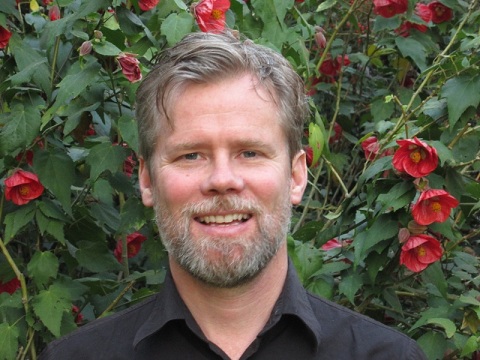I'm a huge fan of Worldchanging. It's a big source of inspiration for Shareable. Shareable is like Worldchanging in ways, but we're more focused on the social versus the eco-technological side of sustainability.
In fact, we co-hosted Design 4 Resilience (D4R) to highlight how resilience unites the social and ecological perspective in one model of how things work. And to explore how resilience thinking can help us design systemic solutions.
I was delighted then to see that Worldchanging's Alex Steffen joined the D4R discussion Saturday with this amazing post. Here's a response to the first part of Alex's thoughtful and wide ranging commentary:
Alex says that we can't rely on individual choices or suburban islands of sustainability to add up to the change we need. I agree. Change requires collective action at scales above the level of the self, home, and neighborhood.
However, I don't necessarily see a conflict between the two strategies. They can be highly complementary. Resilience thinking offers a resolution. It recognizes the following: that there's multiple scales of organization in a system, each scale has it's own adaptive cycle, cycles at lower scales are shorter, cycles at higher scales takes more time, each scale can be in a different place in the adaptive cycle, and that scales are linked.
One implication of this is that we need to be engaged at multiple scales while realizing that change at higher scales will take much longer than at the lower scales. We shouldn't get discouraged because change at higher scales take more time. No need to become a misanthrope because of this fact. Rather, stay in the game at higher scales. The game goes to individuals and groups with stamina and a shared long-term vision.
But where do folks get the stamina and shared vision?
Here's an idea. At first, individuals probably should focus on changes they can easily make in their lives, homes, and neighborhoods that free up time and resources. Individuals have more freedom to change, better chances at success, and can experience success quickly at these scales. Success at these scales builds capacity enabling engagement at higher scales.
From Shareable's perspective, this does not mean buying your way to green. In fact, that's a trap. It increases rigidity and reduces resilience. Instead, individuals can save time and money by reducing consumption and sharing resources.
In resilience thinking, this means that individuals store energy and create buffers for themselves. This enables them to participate at the next scale. Many folks are so consumed by making ends meet that they can't participate in civil society. Individuals must have buffers not only to absorb surprises, but also so they can engage in collective action.
In any case, the path to large-scale social change has to start somewhere. It starts with self, home, and neighborhood. The foundation of change is local. But the foundation must direct energy at the higher scales at some point if there's to be lasting, systemic change.
This is where innovations like Stephanie Smith's WeCommune, Rentalic's resource sharing platform, and free markets play a role. They help people reduce overhead while building community. They can free up resources needed for engagement and build the social capital necessary for collective action at higher scales. It can get people in the fight.
In this strategy, there's no conflict between individual change and collective action, rather they complement each other. And environmental and social progress is made at the same time, which is essential. There's not enough time or energy to solve all the pressing social and environmental problems separately. And I don't think that would work anyway. We need solutions that solve multiple problems with impact at multiple scales.
Sound crazy? The explosive growth of the evangelical movement is based on self-empowerment through small group ministries. They have learned that they can't bring people to Jesus whose lives are in continual crisis. Some of the most successful megachurches deliberately move members through a process of empowerment beginning with self but leading to a lifestyle tied to a larger social mission. This is a highly effective strategy for member retention and growth. It's so effective that progressive groups like Engage Network and the Social Democratic Party in Austria are copying them.
This perspective shows bloggers like Leo Babauta of ZenHabits, Everett Boque of Far Beyond the Stars, and Tammy Strobel of RowdyKittens in a different light as well. You can dismiss them for only working at the level of individual change, which I used to. Or realize they that they have a place in social change. Their wildly popular advice helps readers create buffers which make it possible for them to help others.
Leo Babauta is clear that helping others is part of the formula of a good life. Tim Ferris, arguably the king of the "lifestyle designers," says in his bestseller The Four-Hour Work Week that the purpose of freeing yourself is to advance your education and serve the common good. RowdyKittens' slogan is social change through simple living.
Does their brand of empowerment translate into social change? I'm not sure. I agree with Alex. Individual change does not necessarily aggregate to systemic social change. Spending less, eliminating debt, simplifying your life, and going carfree will not change how political campaigns are financed, improve education, or spur more investment in public infrastructure. It does create some of the conditions that make collective action more likely, but doesn't guarantee it.
I believe that individual change must be translated upward to get lasting systemic change. And systemic change can help lifestyle designers advance further on their path of liberation. Consider that you can only advance so far by yourself. To push through to new, higher levels of liberation, individuals need to engage in the political process to create collective structures that have bias toward liberation. One important lesson I've learned is that freedom, health, and happiness have strong collective properties. They're not like possession that you can acquire for yourself. They are created by agreements between people.
So, unlike the evangelical churches and groups under the Engage Network umbrella, I don't see that happening in a systematic way with lifestyle designers (feel free to set me straight in comments).
So, I'll end this post with a call to action first for social entrepreneurs: design interventions that solve multiple problems with impact on multiple scales.
And then for lifestyle designers: Explore what changes at the scale of city and nation are needed to make it easier for you to liberate yourselves. And begin organizing yourselves to advocate for these changes. For instance, many lifestyle designers talk about the benefits of going carfree. Good public transportation, robust bike and pedestrian infrastructure, and high-density urban development can make it much easier to go carfree. These solutions require political engagement.









